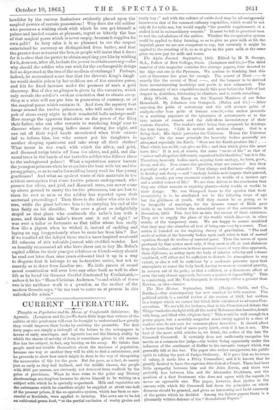The New Review. September, 1863. (Hodges, Smith, and Co., Dublin.)—Our
contemporary has now reached its fifth number. Tho political article is a careful review of the session of 1863, but written in a temper which we cannot but think little calculated to advance Con- servatism. We are told, for instance, that in the Churchward debate the Whigs "rushed to the fight with all the zeal of Mohammedan fanatics,drunk with bang, and blind with religions fury." This would be well enough in a penny paper, but a monthly magazine must surely appeal to a class of readers who do not care for common-place invective. It should affect a better tone than that of mere party spirit, even if it has it not. The best of the more solid articles is, we think, the notice of the late Sir
Cresswell Cresswell. It certainly does not sufficiently recognize his merits as a common-law judge—the writer being apparently under the influence of the sentiment of dislike to his sarcastic temper which waa generally felt at the bar. The paper also rather exaggerates his public spirit in taking the post of Judge-Ordinary. If it gave him no increase
of salary, it made him a Privy Counsellor ; and it is known that ho greatly desired to have the supreme direction of a Court. There had been little sympathy between him and Sir John Jervis, and there was probably less between him and Sir Alexander Cockburn, and the position of a first lieutenant who does not agree with the captain is never an agreeable one. The paper, however, does justice to the success with which Sir Cresswell laid down the principles on which divorces should be granted, and gives an interesting and lucid summary of the points which he decided. Among the lighter papers there is a
pleasantly written defence of the " Roundabout Papers."






























 Previous page
Previous page